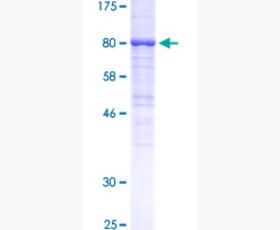Recombinant Human Prostatic Acid Phosphatase/ACPP
| Product name: | Recombinant Human Prostatic Acid Phosphatase/ACPP |
| Source: | Human Cells |
| Purity: | Greater than 95% as determined by reducing SDS-PAGE. |
| Buffer Formulation: | Supplied as a 0.2 μm filtered solution of 20mM TrisHCl, 150mM NaCl, pH 7.5. |
| Applications: | Applications:SDS-PAGE; WB; ELISA; IP. |
| Storage: | Avoid repeated freeze/thaw cycles. Store at 2-8 oC for one month. Aliquot and store at -80 oC for 12 months. |
| UOM: | 100ug/50ug/200ug/1mg/1g |
| Source | Human Cells |
| Description | Recombinant Human Prostatic Acid Phosphatase is produced by our Mammalian expression system and the target gene encoding Lys33-Asp386 is expressed with a 6His tag at the C-terminus. |
| Names | Prostatic Acid Phosphatase, PAP, 5'-Nucleotidase, 5'-NT, Ecto-5'-Nucleotidase, Thiamine Monophosphatase, TMPase, ACPP |
| Accession # | P15309 |
| Formulation | Supplied as a 0.2 μm filtered solution of 20mM TrisHCl, 150mM NaCl, pH 7.5. |
| Shipping |
The product is shipped on dry ice/ice packs. |
| Storage |
Store at < -20°C, stable for 6 months after receipt. Please minimize freeze-thaw cycles. |
| Purity |
Greater than 95% as determined by reducing SDS-PAGE. |
| Endotoxin | Less than 0.1 ng/µg (1 IEU/µg) as determined by LAL test. |
| Amino Acid Sequence |
KELKFVTLVFRHGDRSPIDTFPTDPIKESSWPQGFGQLTQLGMEQHYELGEYIRKRYRKFLNESY KHEQVYIRSTDVDRTLMSAMTNLAALFPPEGVSIWNPILLWQPIPVHTVPLSEDQLLYLPFRNCP RFQELESETLKSEEFQKRLHPYKDFIATLGKLSGLHGQDLFGIWSKVYDPLYCESVHNFTLPSWA TEDTMTKLRELSELSLLSLYGIHKQKEKSRLQGGVLVNEILNHMKRATQIPSYKKLIMYSAHDTT VSGLQMALDVYNGLLPPYASCHLTELYFEKGEYFVEMHYRNETQHEPYPLMLPGCSPSCPLERFA ELVGPVIPQDWSTECMTTNSHQGTEDSTDVDHHHHHH
|
| Background | Prostatic Acid Phosphatase (PAP) belongs to the histidine acid phosphatase family. PAP can catalyze the hydrolysis of member of phosphate monoestyers, including phosphorylated protein. PAP can high expression in metastasized prostate cancer, moderately expression level in bone diseases, blood cell disease, and the concentration of PAP is used to monitor and assess the proession of prostate cancer. The optimum PH of PAP is from 4 to 6; its activity can be inhibited by L(+)-tartrate. |














